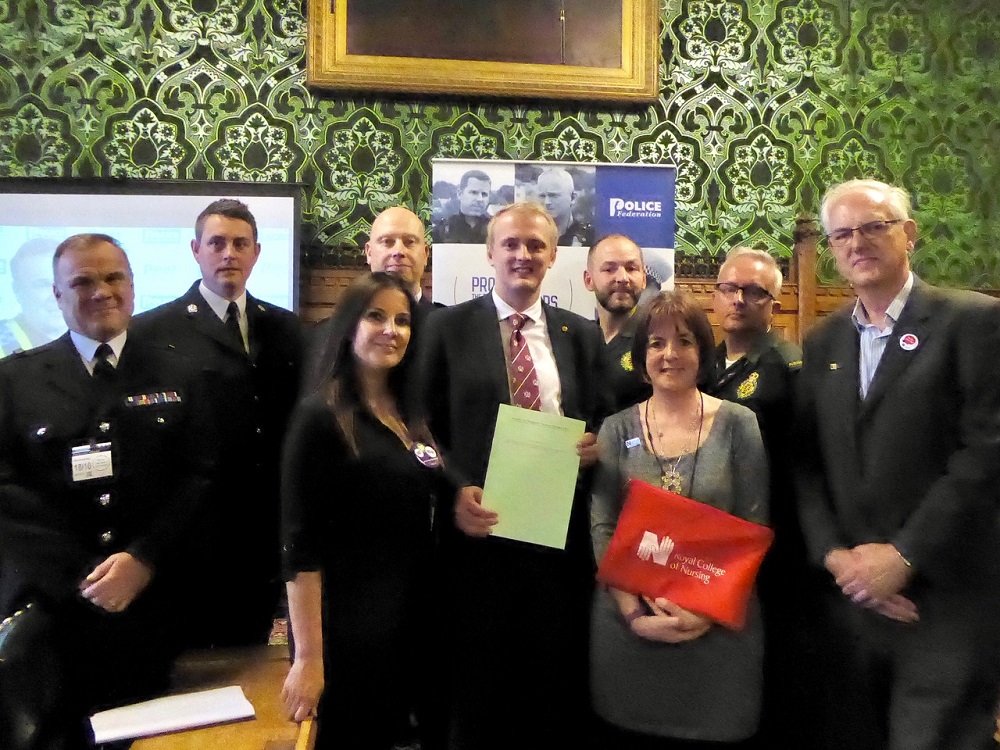More members than ever are being violently assaulted in the workplace. And it’s RCN reps who they turn to for support when they’re feeling at their most vulnerable.
The frightening issue was raised by the RCN UK Safety Representatives Committee (UKSR) at Congress earlier this year. Delegates were presented with shocking detail about the violence members face day-in, day-out.
It’s clear the high levels of sickness absence and numbers of staff who leave after a workplace assault have the potential to have an impact on patient care.
This autumn the committee welcomed the Assaults on Emergency Workers (Offences) Bill, introduced in Parliament. To ensure the severity of the situation was understood by politicians, a group of members lobbied MPs in advance of the Bill’s second reading.
Lesley Pallett, UKSR Vice Chair, attended the lobby. She says: “The impact of such violence on members is huge. It leaves many of them traumatised and having to take time off work to recover, both emotionally and physically. Some leave nursing altogether.”
Scottish evidence
The Bill has now moved to the committee stage but there’s already legislation in place in Scotland where, since 2008, it’s been a specific offence to assault a doctor, nurse or midwife while they're working.
The Emergency Workers (Scotland) Act 2005 carries a penalty of up to 12 months imprisonment and/or a £10,000 fine. And there’s evidence that the legal intervention is having a positive effect. The latest NHS Scotland staff survey found the proportion of staff who had experienced a physical attack had decreased by 10% since 2008.
Health care violence: the facts

- Only half of nurses who report a physical assault are satisfied with the outcome.
- 28% of members recently surveyed have experienced physical abuse in the last 12 months. 70% have experienced verbal abuse.
- The number of physical assaults is rising but the number of criminal sanctions recorded is dropping.
- The estimated cost to the NHS is more than £69 million a year.
Getting to the heart of government
Mike Smith, steward, RCN safety rep and London representative on the RCN UK Stewards Committee, was determined to be heard.
“I was one of six members, all of whom had found themselves either assaulted in the workplace or representing those who had, to end up in a Westminster parliamentary committee room with MPs lining up to talk to them. It was a unique opportunity to share stories of nurses and other emergency workers being abused ahead of the reading of the Bill.
“Being able to put briefing sheets directly into the hands of MPs and chat to them about our experiences seemed to galvanise the momentum for a change in legislation. It was a privilege to talk to them about what we felt needed to happen.”

Mike (pictured far right) alongside Lesley and other emergency workers at the lobby
The RCN says...
- More action is necessary to protect health care staff.
- More nursing staff should be covered by the Bill (presently it only applies to those working in an accident and emergency department or urgent treatment centre).
- It wouldn’t always be appropriate to take criminal sanctions against a patient due to medical factors.
- The low level of criminal sanctions is a factor behind staff under-reporting such incidents.
- Preventative actions could be taken to reduce and manage the risk of physical assaults. For example, training in conflict resolution, providing lone worker alarms and well-designed environments.
- Staff shortages are contributing to the rise in assaults. The length of time waiting to be seen is cited as a common factor in nursing staff being on the receiving end of aggression.
Find out more
Read the RCN advice on what to do about violence in the workplace.








